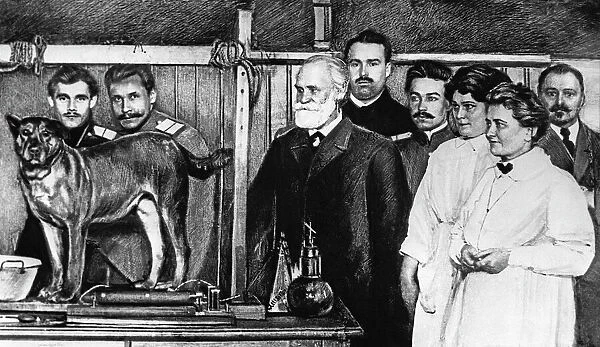Learning Theories in Social Studies
Culturally Responsive Applications of Learning Theories in Social Studies
Who, What, and Where?
:max_bytes(150000):strip_icc()/pavlov-5b42e777c9e77c0037fb1a21.jpg)
Institute of Experimental Medicine at the Imperial Military Medical Academy
Ivan Pavlov, 1849 - 1936. (Behaviorism)

John Hopkins University
John B. Watson, 1878 - 1958. (Behaviorism)

Harvard University
Burrhus Frederic "B.F." Skinner, 1904 - 1990. (Behaviorism)

University of Geneva
Jean Piaget, 1896-1980. (Cognitivism and Psychological Constructionism)

Moscow Institute of Experimental Psychology
Lev Vygotsky, 1896 - 1934. (Social Constructivism)

University of Chicago Laboratory Schools
John Dewey, 1859 - 1952. (Social Constructivism)
Tenets:
I. Behaviorism





BF Skinner's Pigeon Guided Bomb and Soviet Anti-tank dogs used Pavlov's Reflex Conditioning
- Behaviorism is based on the assumption that behavior can be studied scientifically using experiments and objective measurements.
- Behaviorism is primarily concerned with observable behavior, not internal mental states or cognitive processes.
- Behaviorism believes that behavior is the result of stimulus-response associations, which can be modified by reinforcement or punishment.
- Behaviorism is reductionist, meaning that it tries to explain complex phenomena by breaking them down into simpler components.
II. Cognitivism
- Cognitivism is based on the assumption that learning is an active and constructive process, not a passive and mechanical one.
- Cognitivism is primarily concerned with cognitive processes, such as perception, attention, memory, reasoning, problem-solving, decision-making, and metacognition.
- Cognitivism believes that learning is influenced by factors such as prior knowledge, motivation, interest, goals, strategies, and feedback.
- Cognitivism is holistic, meaning that it tries to explain complex phenomena by considering the whole system of knowledge and how it relates to other systems.
III. Psychological and Social Constructivism
A. Psychological
- Psychological constructivism is based on the assumption that knowledge is not fixed or given, but rather constructed through social and individual processes.
- Psychological constructivism is primarily concerned with cognitive processes, such as perception, attention, memory, reasoning, problem-solving, decision-making, and metacognition.
- Psychological constructivism believes that learning is influenced by factors such as prior knowledge, motivation, interest, goals, strategies, and feedback.
- Psychological constructivism is holistic, meaning that it tries to explain complex phenomena by considering the whole system of knowledge and how it relates to other systems.
B. Social
- Social constructivism is based on the assumption that knowledge is not fixed or given, but rather constructed through social and individual processes.
- Social constructivism is primarily concerned with cognitive processes, such as perception, attention, memory, reasoning, problem-solving, decision-making, and metacognition.
- Social constructivism believes that learning is influenced by factors such as prior knowledge, motivation, interest, goals, strategies, and feedback.
- Social constructivism is holistic, meaning that it tries to explain complex phenomena by considering the whole system of knowledge and how it relates to other systems.
Applications
Brief summary of top three learning theories. Source: https://educationaltechnology.net/wp-content/uploads/2023/10/Learning-Theories.png
Behaviorism: When a teacher asks a student to explain an event or person in history, the teacher praises the student for giving a correct answer. When a student calls on a student who is distracted or not paying attention, the teacher reminds the student of class expectations and has another student explain the original prompt to that student. In the first example, the student receives "reinforcement" for their behavior, and in the second example, the student gets a "punishment" for their unwanted behavior.
Cognitivism: Teacher might proctor an assessment quiz to see what level of understanding students already have before a new unit. Teacher would then contextualize their lesson plans to that level of understanding and use scaffolding to expand their knowledge of historical persons and events.
Constructivism (Psychological): "Where do I stand" is an activity in which students are given a thought-provoking prompt to which students respond by physically positioning themselves along a continuum with polar ends being "Strongly Agree" and "Strongly Disagree." Students need to process the prompt, make meaning of it, process their opinions, and then process their opinions within the context of their classmates' opinions after taking their stance.
Constructivism (Social): When students work on a group project, students have the motivation to contribute to the overarching assignment, and the collaborative editing process before final submission employs social constructivism because other students are informing the schemas of other students.
Culturally Awareness
As a student of intercultural studies, my position is that while teachers should, when possible, incorporate the cultural artifacts of others into their curriculum, it is the primary responsibility of all educators to prepare their students to be successful members of society. Public schools are overcorrecting in progressing multiple cultures, customs, and languages, creating division and confusion among students. Students are graduating high schools with little to no understanding of American values and identity and lower academic outcomes.
In lesson planning, I intend to identify historical figures who are immigrants whose families come from other cultures and countries. Then, share the accomplishments and contributions of this individual to the class to appreciate the contributions of cultural minorities. I do not find it authentic to appropriate other cultures into my lesson plan; this is well-intentioned pandering, and secondary education students are cognisant of inauthenticity. Over time, these acts erode the trust and credibility of educators before their students. Educators should be aware of cultures, customs, and other languages, but they should build bridges "scaffold" into this country's dominant culture, customs, and language. It is a disservice to inhibit the enculturation and language acquisition of first and second-generation immigrant students out of a desire to preserve culture, customs, and language. This is the task of parents and families to preserve their heritage and language. It is an overreach and a hubristic act of public schools to foster other cultures while simultaneously attempting to meet state and federal education standards. I assess that school districts and teachers already have the daunting task of meeting standards. Expecting educators to be "culturally responsive" is a distraction from the primary objective of public education. There aren't sufficient resources to accomplish both tasks. Therefore, schools should become resource hubs and direct immigrant families to community organizations with the dedicated goal of preserving and promoting diverse heritages and cultures.
Students should be taught that while we come from distinct and unique backgrounds, there will always be an operative language and culture. Each employer, even international companies, has specified languages, explicit and implicit organizational values, dynamics, and customs. I value Dual-Language education and believe that it has its place. However, my experience has been that teachers are expected to accommodate all cultures, languages, and customs presented in our ever-increasing diverse classrooms. This is untenable and is not contributing to a sense of social unity. The social fabric of the USA is deteriorating, and public schools should do what they can to promote collective values, identity, and English language use.
References:
Hammond, Z. (2015). Culturally responsive teaching and the brain: Promoting authentic engagement and rigor among culturally and linguistically diverse students. Corwin.
Schunk, D. H. (2012). Learning theories: an educational perspective (6th ed.). Pearson.